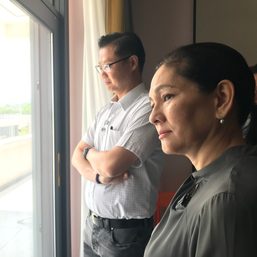SUMMARY
This is AI generated summarization, which may have errors. For context, always refer to the full article.
Acting on his previous warnings, Senate President pro tempore Ralph Recto filed a resolution urging the Commission on Elections (Comelec) and the Department of Information and Communications Technology (DICT) to safeguard the 2022 elections from foreign interference.
The resolution, filed Monday, October 12, urges the two agencies to devise and install a tool that would detect and repel foreign interference in the upcoming national polls.
“This early, regardless of our political affiliation, we should work as one in making sure that no offshore black propaganda operations would mar the 2022 elections,” Recto said in an earlier statement.
Recto’s proposed resolution seeks an inquiry into the use of social media platforms for foreign interference. “These social media interferences may pose bigger problems for the country’s sovereignty,” Recto explained.
This echoed a statement Recto made on September 24, calling on the Comelec and DICT to “firewall” the 2022 elections.
“Whether they are peddling fake news, or counterfeit products, or bogus services, and regardless of where they are run, these sites should have no space in social media platforms,” Recto said.
Facebook takedowns
The resolution mentions the takedown of multiple Facebook accounts on September 22. Facebook said the accounts violated its policy against “coordinated inauthentic behavior” on behalf of a foreign or government entity. Some of the accounts were linked to the Philippine military and police, according to Facebook.
Facebook Head of Security Policy Nathaniel Gleicher said the company removed more than a hundred accounts, including several on Instagram, that violated the policy against foreign or government interference. The activity of many of these entities were said to have originated in China.
“Although the people behind this activity attempted to conceal their identities and coordination, our investigation found links to individuals in the Fujian province of China.”
These accounts made posts “about global news and current events including Beijing’s interests in the South China Sea, Hong Kong, content supportive of President Rodrigo Duterte and Sarah Duterte’s potential run in the 2022 presidential election, criticism of Rappler…issues relevant to the overseas Filipino workers, and praise and some criticism of China,” said Gleicher.
‘Manchurian candidate’
Recto’s resolution also mentioned that experts have expressed that China would interfere in the upcoming elections.
“Filipino experts expressed that as China tries to tighten its grip on the Philippines, it would interfere in the Philippine national elections in 2022 by backing a presidential candidate, even fielding two or more ‘Manchurian candidates,'” the resolution stated.
In June, Ambassador Laura del Rosario, former Undersecretary for International Economic Affairs at the Department of Foreign Affairs, said some experts believe that there will be at least two Manchurian candidates in the 2022 elections.
A “Manchurian candidate” is one who is under the control or influence of a country or political party other than their own.
“I don’t believe that candidates will be in cahoots with alien interests, and I know that as patriots they will not condone an intrusion even if it is meant for their benefit. But nothing prevents foreign agents who have so much at stake here from propping up their favored candidate and pulling down the ones they dislike,” Recto said in a statement.
Current measures
There are existing measures that tackle foreign interference in Philippine elections.
The 1987 Philippine Constitution prohibits foreign governments from giving financial contributions to political parties, organizations, coalitions, and candidates related to elections. This is said to be an interference in national affairs.
The Omnibus Election Code deems unlawful any direct or indirect aid given by a foreigner to a candidate or political party. It also prohibits foreigners from influencing or participating in an election, or contributing to a campaign.
The measure also forbids foreigners and foreign corporations from contributing to partisan political activity. – Rappler.com
Editor’s note: Jacob Reyes is a volunteer at Rappler. He is studying AB Communication at the Ateneo de Manila University.
Add a comment
How does this make you feel?



![[New School] Tama na kayo](https://www.rappler.com/tachyon/2024/02/new-school-tama-na-kayo-feb-6-2024.jpg?resize=257%2C257&crop=290px%2C0px%2C720px%2C720px)
![[Only IN Hollywood] After a thousand cuts, and so it begins for Ramona Diaz and Maria Ressa](https://www.rappler.com/tachyon/2024/02/Leni-18.jpg?resize=257%2C257&crop=262px%2C0px%2C720px%2C720px)





There are no comments yet. Add your comment to start the conversation.